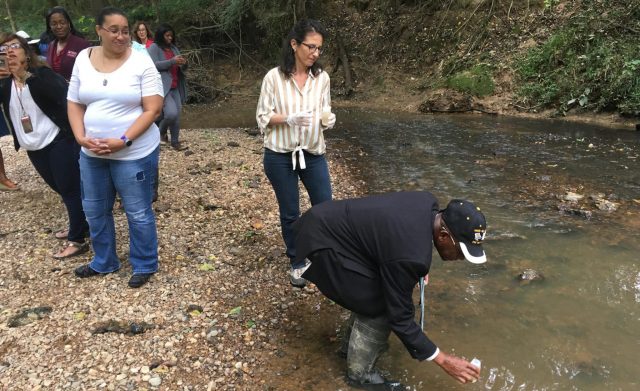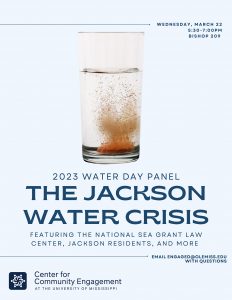
Members of a university-sponsored research team collect water samples in Jackson in 2018 to explore the link between water quality and health. Another water quality effort coming up this weekend is a Sardis Lake clean-up, set for Sunday (March 26) afternoon. Photo by Kristie Willett/UM School of Pharmacy
OXFORD, Miss. – For many, it is unfathomable to think of going without access to water. It is a basic necessity and, arguably, a human right. For more than 150,000 Jackson residents, however, the unfathomable became reality last summer when the city’s water system failed.
University of Mississippi students, staff and faculty will gather Wednesday (March 22) to discuss Jackson’s water crisis at the second annual Water Day Panel. The panel will feature students from Jackson State University and Millsaps College who will give firsthand accounts of their experiences going without clean drinking water for nearly a month.
“I think we take water for granted,” said Avery McNeece, assistant director for community partnerships in the Division of Diversity and Community Engagement‘s Center for Community Engagement. “For the most part, we are fortunate to live in a part of the world where it’s normally not something we have to get up in the morning and worry about.
“I hope this panel helps our students learn from someone who has been in a water crisis – what it means to not have water and how that impacts lives.”
 Hosted by the Center for Community Engagement, the event is set for 5:30-7 p.m. in Bishop Hall, Room 209. It is free and open to the public.
Hosted by the Center for Community Engagement, the event is set for 5:30-7 p.m. in Bishop Hall, Room 209. It is free and open to the public.
In conjunction with the panel, the Center for and Community Engagement and Aqua Culture, a student organization that works toward conservation of aquatic environments, are sponsoring a Sardis Lake clean-up day from noon to 3 p.m. Sunday (March 26). To volunteer, sign up on this page.
During the panel, Stephanie Otts, director of the National Sea Grant Law Center, will give an overview of the approach that federal and state governments take to protect water resources.
Her talk will touch on the need for government regulation and some of the compliance challenges in that can affect Mississippi communities struggling to find the resources to maintain their infrastructure.
“From a policy standpoint, I think what’s most important is that access to clean water should be considered a human right, and that it takes work and funding for our federal, state and local governments to provide us with that safe drinking water and to protect our water resources,” Otts said.
“These are complicated issues that we all should be more aware of and participate more in the conversation around protecting water and provision of drinking water.”
Madeleine Dotson, a junior majoring in Arabic, economics and political science at Ole Miss, is organizing the event in her role as the environmental and sustainability ambassador for the Center for Community Engagement. The Gulf Coast native created the panel last year after recognizing that many of her classmates were interested in water-related issues.
“I think it’s important to build a community to discuss water-related problems among the university community and other institutions in our state,” Dotson said. “These issues are ongoing and we’re still seeing effects from the Jackson crisis now.
“It’s an endemic problem not just in Mississippi but also across the South.”